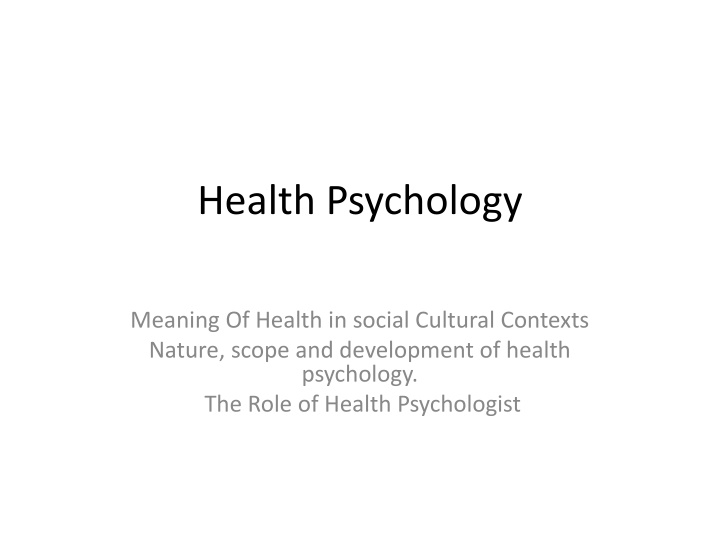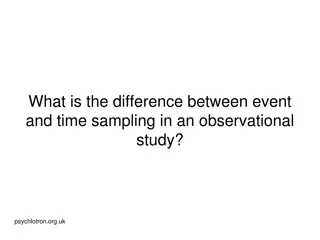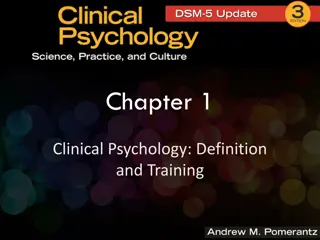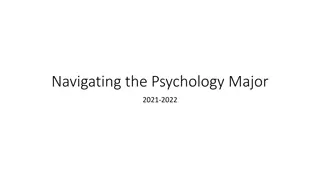Health Psychology
The meaning of health in social and cultural contexts, the nature and scope of health psychology, and the role of health psychologists in promoting well-being and preventing illness. Health psychology combines psychological knowledge and techniques to understand how factors like lifestyle, social influences, and living conditions impact physical and mental health. It focuses on the interdisciplinary approach to improving healthcare systems and overall health outcomes."
Download Presentation

Please find below an Image/Link to download the presentation.
The content on the website is provided AS IS for your information and personal use only. It may not be sold, licensed, or shared on other websites without obtaining consent from the author.If you encounter any issues during the download, it is possible that the publisher has removed the file from their server.
You are allowed to download the files provided on this website for personal or commercial use, subject to the condition that they are used lawfully. All files are the property of their respective owners.
The content on the website is provided AS IS for your information and personal use only. It may not be sold, licensed, or shared on other websites without obtaining consent from the author.
E N D
Presentation Transcript
Health Psychology Meaning Of Health in social Cultural Contexts Nature, scope and development of health psychology. The Role of Health Psychologist
Health According to WHO 1946 Health is a state of complete Physical, mental, and social well being & not merely the absence of disease. According to the Marks et al 2005. Health is a state of well being with physical cultural , psychological economic and spiritual attributes, not simply the absence of illness.
Health Psychology According to Joseph Matarazzo, 1982 and authorized by American Psychological Health Psychology Aggregate of educational, Scientific professional contribution of the discipline of psychology to the promotion and maintenance of health, the prevention treatment of identification of etiological and diagnostic correlates of health, illness and related dysfunctions and the improvement of the health care system and formation Health interdisciplinary field concerned with application of psychological knowledge and techniques to health, illness and health care. Psychology is an Association, is the the specific and Health psychology is the study of psychological and behavioural processes in health, illness, and healthcare. It is concerned with understanding how psychological, behavioural, and cultural factors contribute to physical health and illness. Psychological factors can affect health directly. and the illness, analysis and health policy
Determinants which effects the Health According to Dahlgren & Whitehead ,1991 Age , Sex & Hereditary Individual Lifestyle Factors Social & Community Influences Living & Working Conditions General Socio-Economic, Cultural & Environmental Condition
Health in Socio- Cultural Context According to the Chouhan 2005, 1. Personal Context 2. Economic Context i.e BPL, Over Population and Illiteracy 3. Social & Cultural Context
Nature of Health Psychology Scientific Applied Interdisciplinary
Objectives of Health Psychology Focus on health promotion and health maintenance. Prevention and treatment of illness Focus on the aetiology and correlates of health , illness and dysfunctions. Analyze and attempt to improve the health care system and the formulation of health policy Other Interventions Reducing stress , enhancing quality of life, reducing disability and increasing personal mastery, coping skills, personal management, bolstering the immune increasing the adherence to medical prescriptions. system functioning and
Scope of Health Psychology & its Intervention in Health Care Manage Chronic & life threatening disease such as arthritis, diabetes and cancer. Treat Psychophysical disorder such as hypertension , headache, insomnia etc. Provide complementary medical symptoms such as pain and psychological comorbidity such as depression , stress and for patients who cope with surgery and other stressful medical procedure care for patients with
Development of Health Psychology History of health psychology Two Major Perspective 1. One is Biomedical tradition A approach which claims that disease is solely because of biological factors. Later , scientist developed the germ theory ( disease caused by microorganisms, proposed in the mid 16thcentury) by focusing on the structure and genes to define and understand illness and disease. Limitations of this approach was that this tradition is full with somatic correlates. Critics argued that under the light of this tradition we still don't know the actual aetiology of diseases. Though it is still an important phenomenon in understanding illness but it does not give adequate account for illness and disease.
History 2. The Psychosocial Perspective : this perspective focussed on the psychological and social factors of illness. 1940 s this wide phenomenon merged into one field called medicine Psychosomatic medicine phenomenon is based on assumption that psychological factors can be the cause of some diseases. In 1950, according to researchers, some psychosomatic diseases such as peptic ulcers. Essential hypertension and bronchial asthama. By 1960 s there was a change in perspective as the research line demonstrated that how personality and behaviours cause the disease. For ex. Smoking and overeating correlate to some major diseases. During 1960 s due to increase in stressful events it was implicated that stressful life events are the risk factors for illness. psychosomatic
History.............. 3. Bio psychosocial Model ( Third Perspective) : This model is the mixture of both perspectives as the name implies that diseases are caused by biological, social and psychological factors. Biological influence includes biochemical imbalances, or nutritional deficiencies and psychological factors include person s behaviors, emotional and cognitive Processes.
The Role of Health Psychologist They Healthy lifestyle. Focus on how to promote regular exercise and good eating habits. To help with the treatment of illness Help patients emotional adjustment including depression and anxiety. Stress management Programme, Pain management Evaluate prevention intervention programs Try to find ways to encourage people to improve their health. provide Knowledge of dealing with problems, and
The Role of Health Psychologist To measure the level of mental health To promote and maintain the health To improve the health care system The formulation of health policy. To investigate the psychological correlates of illness. Help in designing health promotion campaigns in community that targets at changing risk factors for CHD (e.g.. anti smoking and anti obesity campaigns) The identification of psychological factors that contribute to physical illness
Any Questions ? !! Thank You !!























